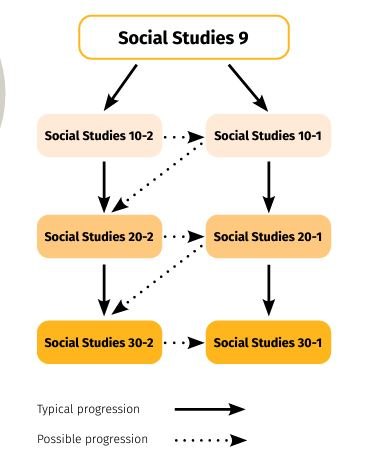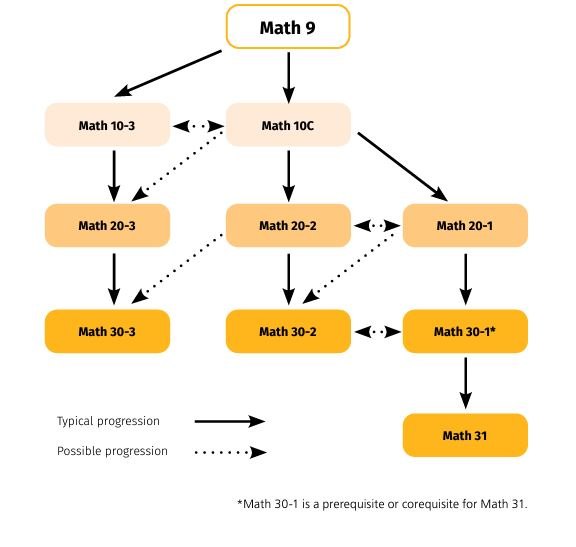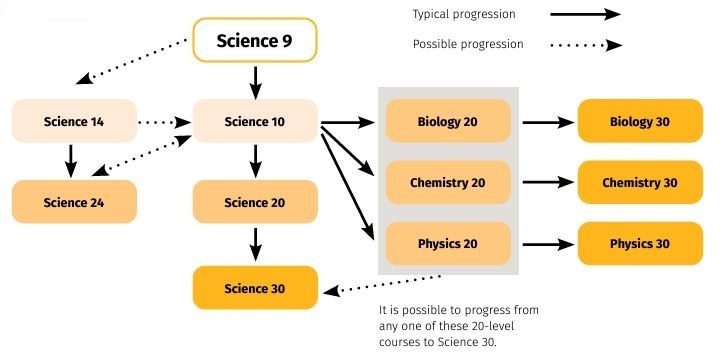Academic Courses
ENGLISH
A 30-level English course is required to meet graduation requirements

English 10-1, 20-1, 30-1
English 10-1, 20-1, 30-1 is a more specialized program; therefore, students must be interested in literary work and must assume an increasing degree of responsibility for their academic progress. Human experiences and values are explored through literature, and English teachers employ literature, classic and contemporary. The educational benefits gained by studying issues, even controversial issues, through literature include critical thinking, moral reasoning and an awareness and understanding of contemporary society and self.
English 10-2, 20-2, 30-2
English 10-2, 20-2, 30-2 are the courses in the foundational English route. The courses emphasize the practical application of writing skills, as well as, understanding, appreciation, and enjoyment of literature, and are an acceptable prerequisite for many colleges and trade schools. Human experiences and values are explored through literature, and English teachers use a variety of texts. The educational benefits gained by studying issues, even controversial issues, through literature include the development of critical thinking, moral reasoning, and an awareness and understanding of contemporary society.
Advanced Placement English
Advanced Placement English is offered at the Grade 10, 11, and 12 levels. The Advanced Placement program will consist of three semestered English courses. Students enrol in English 10-1 AP in Grade 10, followed by English 20-1 AP in Grade 11, and English 30-1 AP in Grade 12. These three courses cover all the material for English 10-1, 20-1, and 30-1, but at an enriched level of depth and slightly faster pace. Students may join the AP program at any time without having completed prior AP courses at the recommendation of their teacher.
English 30-1 AP is equivalent to a first semester university English course. Upon completion of the course, students are prepared to write the AP English exam. A score of 4 or more on this exam will allow the student to receive university credit and/or achieve advanced placement at over 4000 colleges and universities worldwide.
Creative Writing

The creative writing course is designed to encourage writing and to allow experimentation with styles and various skills. It is a process-oriented, skill building, exploratory course. Whether your goal is to become a published author or you simply want to write for pleasure, the creative writing course will give you ample opportunity to play.
Students who register for the creative writing course should do so with the genuine intent to engage in the writing process and to produce original texts. While no experience is needed to be a student in the course, students must be self-motivating and willing to do the work, share their work with others, and discuss others’ work. The grade is based on term work; there is no exam for this course.
THE CORE - Written by Creative Writing Students
K & E English 10-4, 20-4, 30-4
For information on our Knowledge and Employability English 10-4, 20-4, 30-4 program, please see your advisor.
SOCIAL STUDIES

A 30-level Social course is required to meet graduation requirements
Social Studies 10-1
Globalization, the process by which the world’s citizens are becoming increasingly connected and interdependent, demands that students explore responsibilities associated with local and global citizenship and form individual responses to emergent issues related to globalization.
Social Studies 10-1 Leadership
This enriched course will include an emphasis on developing student leadership skills while still covering all the major outcomes from the regular Social Studies 10-1 curriculum. Students will explore basic principles of leadership, evaluate their personal leadership characteristics and qualities, and explore leadership within a team. They will also examine and demonstrate effective communication, public speaking, and presentation skills. These topics will be integrated into the regular learning of Social 10-1 and allow students to earn two additional credits for the course.
Social Studies 20-1
Students will explore the complexities of nationalism in Canadian and international contexts. They will study the origins of nationalism and the influence of nationalism on regional, international, and global relations. Students will develop understandings of nationalism and how nationalism contributes to the citizenship and identities of peoples in Canada.
Social Studies 20-2
Students will explore the origins of nationalism as well as the impacts of nationalism on individuals and communities in Canada and other locations. Examples of nationalism, ultranationalism, supra-nationalism, and internationalism will be examined. Students will develop personal and civic responses to emergent issues related to nationalism.
Social Studies 30-1
Students will explore the origins and complexities of ideologies and examine multiple perspectives regarding the principles of classical and modern liberalism. An analysis of various political and economic systems will allow students to assess the viability of the principles of liberalism. Developing understandings of the roles and responsibilities associated with citizenship will encourage students to respond to emergent global issues.
Social Studies 30-2
Students will examine the origins, values and components of competing ideologies. They will explore multiple perspectives regarding relationships among individualism, liberalism, common good and collectivism. An examination of various political and economic systems will allow students to determine the viability of the values of liberalism. Developing understandings of the roles and responsibilities associated with citizenship will encourage students to respond to emergent global issues.
K & E Social Studies 10-4, 20-4
For information on our Knowledge and Employability Social Studies 10-4, 20-4 program, please see your advisor.
MATHEMATICS
A 20-level Math course is required to meet graduation requirements
Math 10C
Math 10C will be a combined course and will be the starting point for the 20-1/30-1 or 20-2/30-2 course sequence. The 10C course will build upon previous knowledge acquired in Math 9.
Math 10-3
This course is the beginning course in the 20-3/30-3 sequence and is designed to provide for entry into the majority of trades and for direct entry into the workforce.
Math 20-1/30-1
This sequence is for university, college, and technical school students entering programs such as engineering, mathematics, science, and commerce, or other programs that require advanced math skills. The sequence is a co-requisite for Math 31 (Calculus).
Students entering this sequence would be expected to enroll in Math 31.
Math 31

Math 30-1 is the corequisite for Math 31
This course provides students with the opportunity to pursue a first course in calculus. Math 30-1 should be taken as a prerequisite course.
Math 20-2/30-2
This sequence is for university, college, and technical students entering programs that do not require calculus skills. This sequence is for students enrolling in arts programs, civil engineering technology, medical technologies, and some apprenticeship programs.
This path will fulfill most students’ needs.
Math 20-3/30-3
This sequence is for students wanting to apprentice to the trades or enter the workforce directly after high school. The sequence is designed to meet the entrance requirements for apprentices in most trade programs.
Advanced Placement Mathematics
The Advanced Placement program for Math will consist of 3 semester Math courses. Students enroll in Math 10C AP in Grade 10, followed by both Math 20-1 AP and Math 30-1 AP in Grade 11. These 3 courses cover all the material for Math 10C, Math 20-1, and Math 30-1 but at an enriched level of difficulty and slightly faster pace.
In Grade 12, students enroll in Math 31 AP. Math 31 AP is equivalent to a first semester university Calculus course. Upon completion of the course, students are prepared to write the AP Calculus exam. Successful completion of this exam will allow the student to receive university credit and/or achieve advanced placement at over 4000 colleges and universities worldwide.
K & E Math 10-4, 20-4
For information on our Knowledge and Employability Mathematics 10-4, 20-4 program, please see your advisor.
SCIENCE
A 20-level Science course is required to meet graduation requirements
Science 10
Science 10 is an introductory course designed to provide a means of showing the connections among the scientific disciplines. The course is organized as units in integrated science, biology, chemistry and physics. Strong math skills and reading comprehension are important for this course. Students enrolled in Math 10 Prep or Math 10-3 are recommended to complete that course before taking Science 10.
Science 14
Science 14 is a general introductory course to biology, chemistry and physics, and the application of science to everyday life. The course is designed to meet the needs and interests of students who want the basic requirements for a high school diploma. It may be offered in a modularized independent study format.
Science 20

Science 20 builds on concepts learned in Science 10 and continues the study of chemical changes, changes in motion, climate change, plate tectonics, ecosystems, succession and natural selection.
Science 24
Science 24 continues the study of biology, chemistry, and physics and their application in everyday life. It may be offered in a modularized independent study format.
Biology 20
Biology 20 students study the biosphere, cellular matter and energy flow, and matter and energy exchange in ecosystems in the digestive, respiratory, excretory and circulatory systems of the human organism. Laboratory work and field studies reinforce concepts learned in the classroom. Strong reading comprehension is needed in this course.
Chemistry 20
Chemistry 20 students study solutions, concentration, stoichiometry, gases and gas laws, chemical bonding. Laboratory work and societal connections accompany each of these topics. Strong math skills are important in this course, co-requisite for chemistry 20 is either math 20-1 or 20-2.
Physics 20
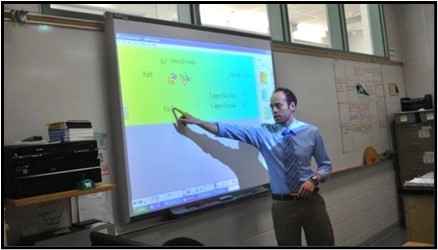
Physics 20 students study both linear and planar motion and forces, circular motion and gravity, mechanical waves, and momentum. Demonstrations, experiments, and technological applications are integrated throughout the course of studies. Strong math skills are important in this course, co requisite for physics 20 is either math 20-1 or 20-2.
Biology 30
Biology 30 focuses on nervous and endocrine systems, reproduction and development, genetics, and population/community dynamics. Strong reading comprehension is needed in this course.
Chemistry 30
Chemistry 30 students review Chemistry 20 and then study energy changes in chemical reactions, oxidation-reduction reactions, chemical equilibrium, acid-base reactions, and organic chemistry. Course material is closely integrated with laboratory investigations and STS issues, students are highly recommended to have math 20-1 or 20-2 already completed before taking the course. Strong math skills are important in this course, corequisite is either math 30-1 or 30-2.
Physics 30
Physics 30 students study conservation laws (momentum), electric forces and fields, magnetic forces and fields, the nature of the atom, radioactivity, and light principles. Experimental work, demonstrations, STS issues, and technological applications are integrated throughout the course, students are highly recommended to have math 20-1 or 20-2 before taking this course. Strong math skills are important for this course, corequisite is math 30-1.
Science 30
Science 30 emphasizes changes in living systems (immunity, genetics), impact of chemicals on ecosystems, electromagnetic radiation, electro-magnetism and electricity, and global energy, Science 30 is a diploma course that can be used for graduation requirements and Rutherford considerations.
PHYSICAL EDUCATION
Physical Education 10/CALM is a graduation requirement
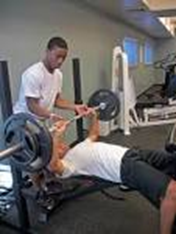
Physical Education 10/CALM
Our objective is to promote an active, healthy lifestyle with our students through new, exciting activities and fun with traditional sports & games. The course will work towards achieving this objective by offering health and nutritional education, activities in the community, guest instructors, and a variety of individual and team sports as well as games. We are promoting a modular delivery to allow kids more choice in their experience as we develop this full-time class. GET ACTIVE!! CALM components are offered to all students, during their scheduled class time, who are in Phys. Ed. 10.
Physical Education 20/30
This program will continue to promote an active healthy lifestyle through exciting activities both on and off campus. In PE 30, exposure to new and fun experiences will lead to a healthy active student now and in the future. Some included activities are: tennis, archery, scuba diving, skiing, fitness, yoga, badminton, and games.
Athletic Performance 1/2/3
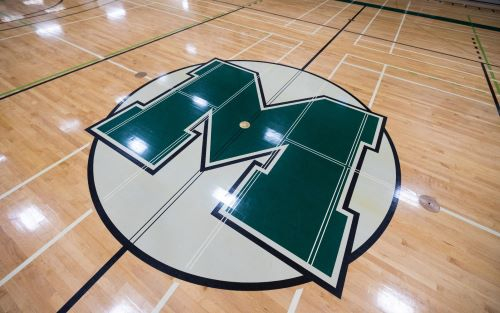
This course is recommended for every student, not just the student athletes. Athletic Performance provides the opportunity for any student to develop their speed, strength, and agility in addition to an in-depth understanding of factors related to fitness, health and wellness. The importance of learning proper training principles, performance enhancement, programming, and sports injuries are the focus. Personal involvement in sport and personal development through goal setting, self evaluation, and reflection will be included. Students can focus on the principles of fitness and relate them to their own sport specialty.
Students will work out regularly, be evaluated, and participate in classroom theory. Our fitness centre, the gym, and community facilities will be used to train our students into bigger, stronger, faster athletes.
Individual Sports – PE 20/30

Golf, Badminton, Archery, Fitness

This course is offered at MHHS for any grade 10-12 student interested in individual sports with a strong focus on golf. It will also provide instruction in other areas such as badminton, archery and fitness. This course is intended to provide enhanced learning opportunities for any student interested in the pursuit of life-long individual athletic endeavours. Skill development, training principles, fitness, strength training, mental preparedness, goal setting and nutrition will be the main focus. Self coaching and evaluation themes will also be explored. CTS credits will be awarded initially with the option of accessing PE 20/30 credits as well.
Baseball 1/2/3

Baseball Class is provided as a Spring option where students will earn their Physical Education 10, 20 or 30 credits. Students should have previous experience in the game of baseball with a strong desire to grow their skill set to compete at the high school and provincial level. During the Spring, students will have the opportunity to work on strength and conditioning, with regular practices either indoors or at our outdoor practice facility. We take regular field trips to local training centers and provide students with the latest techniques to propel their game to the next level. This is a very competitive class with a great deal of game simulations provided throughout the week.















